Lightworks is a freemium non-linear editing system (NLE) for editing and mastering digital video. It was an early developer of computer-based non-linear editing systems, and has been in development since 1989. Lightworks won a 2017 EMMY Award for being one of the first to create digital nonlinear editing software. The development of an open-source version was announced on April 11, 2010. However, no source code of the program has been released. In July 2020, a Lightworks product manager confirmed that they "Still hope to announce something in the future" about Lightworks' open source development.

CinePaint is a free and open source computer program for painting and retouching bitmap frames of films. It is a fork of version 1.0.4 of the GNU Image Manipulation Program (GIMP). It enjoyed some success as one of the earliest open source tools developed for feature motion picture visual effects and animation work. The main reason for this adoption over mainline GIMP was its support for high bit depths which can be required for film work. The mainline GIMP project later added high bit depths in GIMP 2.9.2, released November 2015. It is free software under the GPL-2.0-or-later. In 2018, a post titled "CinePaint 2.0 Making Progress" announced progress, but version 2.0 has not been released as of 2022.
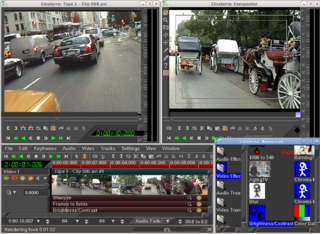
Cinelerra is a video editing and track-based digital compositing program designed for Linux. It is free software distributed under the open source GNU General Public License. In addition to editing, it supports advanced composition operations such as keying and mattes, including a title generator, many effects to edit video and audio, keyframe automation, and many other professional functions depending on the variant. It processes audio in 64 floating-point form. Video is processed in RGBA or YUVA color spaces, in 16-bit integer or floating-point form. It is resolution and image refresh rate independent. The GG variant supports up to 8K video, and can also create DVDs and Blu-rays.
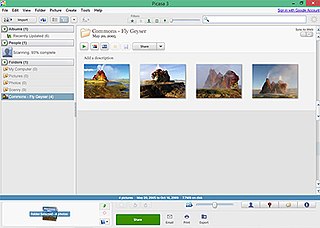
Picasa was a cross-platform image organizer and image viewer for organizing and editing digital photos, integrated with a now defunct photo-sharing website, originally created by a company named Lifescape in 2002. "Picasa" is a blend of the name of Spanish painter Pablo Picasso, the word casa and "pic" for pictures.

ALT Linux is a set of Russian operating systems based on RPM Package Manager (RPM) and built on a Linux kernel and Sisyphus package repository. ALT Linux has been developed collectively by ALT Linux Team developers community and ALT Linux Ltd.
NX technology, commonly known as NX or NoMachine, is a remote access and remote control computer software, allowing remote desktop access and maintenance of computers. It is developed by the Luxembourg-based company NoMachine S.à r.l.. NoMachine is proprietary software and is free-of-charge for non-commercial use.
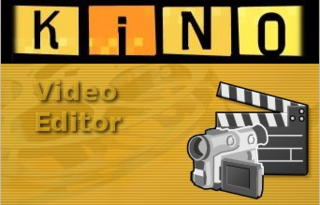
Kino is a discontinued free software GTK+-based video editing software application for Linux and other Unix-like operating systems. The development of Kino was started at the end of 2000 by Dan Dennedy and Arne Schirmacher. The project's aim was: "Easy and reliable DV editing for the Linux desktop with export to many usable formats." The program supported many basic and detailed audio/video editing and assembling tasks.

LiVES (LiVES Editing System) is a free and open-source video editing software and VJ tool, released under the GNU General Public License version 3 or later. There are binary versions available for most popular Linux distributions (including Debian, Ubuntu, Fedora, Suse, Gentoo, Slackware, Arch Linux, Mandriva and Mageia). There are also ports for BSD, and it will run under Solaris and IRIX. It has been compiled under OS X Leopard, but not thoroughly tested on that platform. In early 2019, a version for Microsoft Windows was announced, with a release slated for in the second half of 2019.

Musix GNU+Linux is a discontinued live CD and DVD Linux distribution for the IA-32 processor family based on Debian. It contained a collection of software for audio production, graphic design, video editing and general-purpose applications.

Pitivi is a free and open-source non-linear video editor for Linux, developed by various contributors from free software community and the GNOME project, with support also available from Collabora. Pitivi is designed to be the default video editing software for the GNOME desktop environment. It is licensed under the terms of the GNU Lesser General Public License.

Linux is a family of open-source Unix-like operating systems based on the Linux kernel, an operating system kernel first released on September 17, 1991, by Linus Torvalds. Linux is typically packaged as a Linux distribution (distro), which includes the kernel and supporting system software and libraries, many of which are provided by the GNU Project. Many Linux distributions use the word "Linux" in their name, but the Free Software Foundation uses and recommends the name "GNU/Linux" to emphasize the use and importance of GNU software in many distributions, causing some controversy.
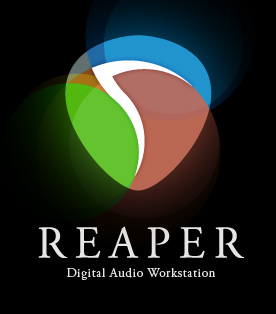
REAPER is a digital audio workstation and MIDI sequencer application created by Cockos. The current version is available for Microsoft Windows, macOS, and Linux. REAPER acts as a host to most industry-standard plug-in formats and can import all commonly used media formats, including video. REAPER and its included plug-ins are available in 32-bit and 64-bit format.

Ubuntu Studio is a recognized flavor of the Ubuntu Linux distribution, which is geared to general multimedia production. The original version, based on Ubuntu 7.04, was released on 10 May 2007.

Scrivener is a word-processing program and outliner designed for writers. Scrivener provides a management system for documents, notes and metadata. This allows the user to organize notes, concepts, research, and whole documents for easy access and reference. Scrivener offers templates for screenplays, fiction, and non-fiction manuscripts. After writing a text, the user may export it for final formatting to a standard word processor, screenwriting software, desktop publishing software, or TeX.

Kdenlive is a free and open-source video editing software based on the MLT Framework, KDE and Qt. The project was started by Jason Wood in 2002, and is now maintained by a small team of developers.

LightZone is a free, open-source digital photo editor software application. It was originally developed as commercial software by the now-defunct Light Crafts. Its main purpose is to handle the workflow, including non-destructive editing when handling images in various RAW formats. LightZone outputs JPEG files which contain metadata references to the original image file location and a record of the transformations applied during editing. It is comparable to Adobe Lightroom.
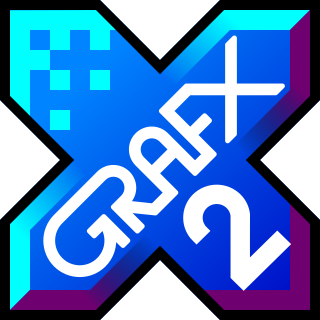
GrafX2 is a bitmap graphics editor inspired by the Amiga programs Deluxe Paint and Brilliance. It is free software and distributed under the GPL-2.0-only license.

According to the Free Software Foundation Latin America, Linux-libre is a modified version of the Linux kernel that contains no binary blobs, obfuscated code, or code released under proprietary licenses. In the Linux kernel, they are mostly used for proprietary firmware images. While generally redistributable, binary blobs do not give the user the freedom to audit, modify, or, consequently, redistribute their modified versions. The GNU Project keeps Linux-libre in synchronization with the mainline Linux kernel.
MainConcept GmbH is a software company founded in Germany by Markus Moenig and Thomas Zabel. They specialize in developing video/audio codecs and also applications and plug-ins related to video/audio encoding. They are a subsidiary of Endeavor Streaming, with employees in Germany, Russia, United States and Japan.

Markus Moenig, is a German Entrepreneur and Computer scientist. He is the CEO of BrainDistrict GmbH, a Graphics software manufacturing company. He was the founder of MainConcept, a video/audio codecs developing company which was acquired by DivX, Inc. in 2007.














